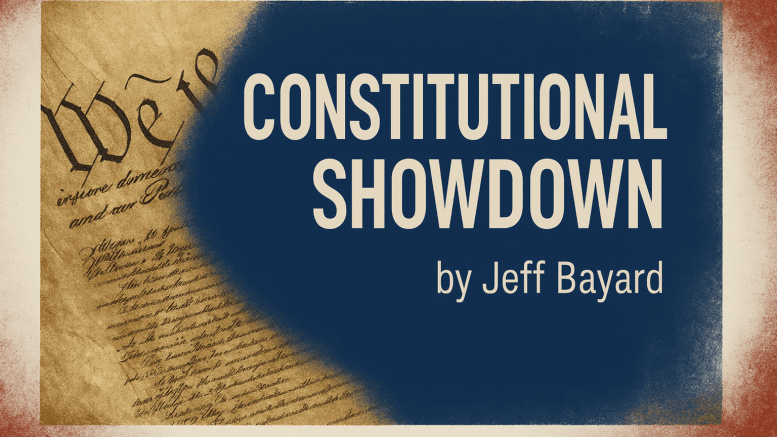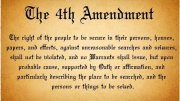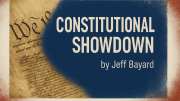Constitutional Showdown: Supreme Court Weakens Judicial Power While Birthright Citizenship Hangs in the Balance
First, a word of thanks to constitutional scholars at institutions like the Heritage Foundation and the Constitutional Accountability Center for their rigorous analysis of this complex constitutional question. By presenting competing interpretations of the Fourteenth Amendment’s original meaning, they have helped illuminate one of the most significant constitutional debates of our time—forcing Americans to grapple with what the framers actually intended when they crafted the citizenship clause in 1868. We continue our Constitutional Showdown series.
The Executive Strike Against the Fourteenth Amendment
On January 20, 2025, within hours of taking his oath to “preserve, protect and defend the Constitution,” President Trump signed an executive order attempting to strip birthright citizenship from children born in the United States. The order declared that babies born in the U.S. would not automatically get citizenship if their parents were in the country illegally or temporarily, directly attacking the Fourteenth Amendment’s guarantee that “All persons born or naturalized in the United States, and subject to the jurisdiction thereof, are citizens of the United States.”
This is not a policy disagreement. This is a constitutional rebellion.
The Judicial Response: Courage Under Fire
Multiple federal courts immediately blocked Trump’s order, with judges across the country issuing nationwide injunctions to prevent irreparable harm. Senior U.S. District Judge John Coughenour, a Ronald Reagan appointee, called the executive order “blatantly unconstitutional” and temporarily blocked its enforcement nationwide.
U.S. District Judge Deborah Boardman in Maryland certified a class of all children who have been born or will be born in the United States after Feb. 19, 2025, who would be affected by Trump’s order, saying the plaintiffs were “extremely likely” to win their argument that the birthright order violates the 14th Amendment.
These judges understood their constitutional duty. As Chief Justice Roberts once said at his confirmation hearing: “Judges have to have the courage to make the unpopular decisions when they have to… That is the judicial oath.”
The Fourteenth Amendment Under Siege
The Fourteenth Amendment was ratified in 1868 to overturn the Supreme Court’s shameful Dred Scott decision, which held that Black Americans could never be citizens. In 1898, the Supreme Court ruled 6-2 in United States v. Wong Kim Ark that the 14th Amendment “affirms the ancient and fundamental rule of citizenship by birth within the territory, in the allegiance and under the protection of the country, including all children here born of resident aliens.”
This precedent has stood for 127 years. As the Supreme Court made crystal clear more than 125 years ago, Trump’s executive order is blatantly illegal, violating both the 14th Amendment and a statute passed by Congress.
The Constitution’s language is clear: “All persons born… in the United States, and subject to the jurisdiction thereof, are citizens.” The Trump administration’s argument that children of people in the country illegally or temporarily aren’t “subject to the jurisdiction” because their parents don’t have “allegiance” to the country contradicts over a century of constitutional law.
Scripture declares: “Let every person be subject to the governing authorities” (Romans 13:1). If these families are subject to our laws—paying taxes, following regulations, facing prosecution for violations—they are subject to our jurisdiction.
The Supreme Court’s Constitutional Betrayal
On June 27, 2025, the Supreme Court delivered a devastating blow to constitutional protection in Trump v. CASA. By a 6-3 vote along ideological lines, the Court sided with the Trump administration and limited the power of federal courts to issue nationwide injunctions that protect all Americans from unconstitutional government actions.
Justice Amy Coney Barrett, writing for the majority, declared that “Universal injunctions likely exceed the equitable authority that Congress has given to federal courts”—a stunning reversal of longstanding judicial practice.
Justice Sonia Sotomayor dissented from the bench—a signal of her strong disagreement—stating that the majority had ruled that “absent cumbersome class-action litigation, courts cannot completely enjoin even such plainly unlawful policies unless doing so is necessary to afford the formal parties complete relief. That holding renders constitutional guarantees meaningful in name only for any individuals who are not parties to a lawsuit.”
Justice Ketanji Brown Jackson filed a separate dissent, arguing that the majority’s “decision to permit the Executive to violate the Constitution with respect to anyone who has not yet sued is an existential threat to the rule of law” and asked: “May a federal court in the United States of America order the Executive to follow the law?”
The Separation of Powers Under Attack
The impact of the Court’s decision is likely to be seismic, both because of the fundamental nature of the right involved and because of what the ruling portends for future challenges to unlawful executive action. The Court has essentially told the executive branch: “You may violate the Constitution against anyone who hasn’t specifically sued you.”
This eviscerates Article III’s judicial power. The CASA case will create new complications for plaintiffs seeking broad relief against government policies far beyond the immigration sphere.
Nehemiah faced similar betrayal from those who should have protected God’s people: “Remember, O my God, Tobiah and Sanballat according to these works of theirs, and also the prophetess Noadiah and the rest of the prophets who tried to make me afraid” (Nehemiah 6:14).
The Constitutional Crisis Deepens
Amanda Frost, a Law Professor at the University of Virginia, defines a constitutional crisis as occurring when one branch of government “blatantly, flagrantly and regularly exceeds its constitutional authority — and the other branches are either unable or unwilling to stop it”.
Professor Frost says the first half of her definition is already happening, pointing to Trump trying to usurp Congress’ “power of the purse” and trying to put an end to birthright citizenship as examples.
Harvard Kennedy School scholars warn that “the first few weeks of the Trump administration may well constitute the most severe attack on the rule of law in the United States since confederate armed forces began lobbing artillery shells into Fort Sumter in 1861”.
What makes this crisis worse is the Supreme Court’s complicity. When Vice President JD Vance issues “chilling warnings that judges ‘aren’t allowed to control the executive’s legitimate power'” or Elon Musk calls a Bush-appointed judge “evil” and says he “ought to be fired”, the Court responds by… limiting judicial power.
The Current Legal Battlefield
Despite the Supreme Court’s betrayal, constitutional defenders are fighting back. Since the June ruling, multiple federal courts have continued to block the birthright citizenship order through class action lawsuits, with the latest coming from New Hampshire in February and Maryland in August.
As of today, every child whose citizenship was threatened by the executive order is protected. The legal fight is far from over, but these families can take solace in knowing that they are protected while the cases make their way through the courts.
The Constitutional Accountability Center notes that “Twenty-two states and Americans around the country who are affected by the illegal executive order will continue their lawsuits” to vindicate the Fourteenth Amendment’s promise.
The Biblical Framework
God’s Word speaks directly to this crisis:
On Constitutional Oath-Breaking: “When a man makes a vow to the Lord or takes an oath to obligate himself by a pledge, he must not break his word but must do everything he said” (Numbers 30:2). Every federal officer swears to defend the Constitution. Trump’s order breaks that sacred oath.
On Protecting the Innocent: “Defend the weak and the fatherless; uphold the cause of the poor and the oppressed. Rescue the weak and the needy; deliver them from the hand of the wicked” (Psalm 82:3-4). These children are the most innocent among us.
On Equal Justice: “You shall not show partiality in judging; you shall hear the small and the great alike” (Deuteronomy 1:17). The Fourteenth Amendment’s promise of equal citizenship reflects this divine command.
On Judicial Courage: “Be strong and courageous. Do not be afraid; do not be discouraged, for the Lord your God will be with you wherever you go” (Joshua 1:9). The dissenting justices and lower court judges showed this courage. The majority did not.
The Call to Constitutional Faithfulness
This constitutional showdown demands careful analysis from every constitutional patriot:
Congress must clarify the law. Rather than leaving this complex constitutional question to competing judicial interpretations, Congress should exercise its constitutional authority to clarify citizenship law according to the Fourteenth Amendment’s original meaning.
The Executive must follow proper process. While the Trump administration may have substantive constitutional arguments about birthright citizenship, major changes to constitutional interpretation should go through proper legal processes, not unilateral executive action.
Courts must respect constitutional limits. The Supreme Court’s limitation on nationwide injunctions addresses a legitimate problem with judicial overreach, but courts must still fulfill their constitutional duty to interpret the law faithfully.
Citizens must demand constitutional literacy. Whether we support narrow or broad interpretations of birthright citizenship, Americans must understand both the substance and the process of constitutional government.
The Church must call for truth and justice. When constitutional questions arise, the Church’s role is not to choose political sides but to call all parties to honest interpretation and faithful execution of their oaths.
Conclusion: A Constitutional Awakening
President Trump’s birthright citizenship executive order represents far more than immigration policy—it’s a strategic constitutional challenge designed to awaken Americans to how far we’ve drifted from our founding principles. His excellent legal team understood that only a direct confrontation would force this long-overdue constitutional reckoning on birthright citizenship.
The Strategic Brilliance: Trump knew this executive order would:
- Force courts to address the Fourteenth Amendment’s actual meaning rather than bureaucratic misinterpretation
- Expose the “anchor baby” absurdity to millions of Americans who never understood the problem
- Create national urgency around a sovereignty crisis that threatens our legal immigration system
- Demonstrate how “living constitution” interpretation has betrayed the framers’ clear intent
The Constitutional Truth: No honest reading of the Fourteenth Amendment supports “anchor baby” citizenship. The framers intended to provide citizenship for freed slaves with no other nation—not to reward illegal border crossing with America’s greatest prize. The phrase “subject to the jurisdiction thereof” was carefully crafted to exclude those who maintained foreign allegiances or violated our sovereignty to get here.
The Divine Foundation: As fundamentalist Christians who believe God’s Word has fixed, unchanging meaning, we must apply the same principle to constitutional interpretation. The Constitution, rooted in “the Laws of Nature and of Nature’s God,” means what the framers intended—not what modern activists want it to mean.
The Call to Action: This constitutional moment demands that faithful Americans:
- Reject “living constitution” interpretation as the same error liberal theology makes with Scripture
- Support constitutional restoration even when the process is messy or controversial
- Educate fellow citizens about original meaning versus activist misinterpretation
- Pray for leaders who will faithfully execute their oaths to defend the Constitution as written
The “anchor baby” era is ending. Constitutional government is being restored. And God’s people must stand firm for truth in law just as we stand firm for truth in Scripture.
When human law aligns with God’s eternal principles of justice and order, nations prosper. When it departs from those foundations, chaos follows. America is choosing which path to take.
For legal researchers and constitutional scholars seeking the full statutory framework, federal court decisions, and Supreme Court precedents discussed in this analysis, comprehensive documentation is available through PACER, the Federal Judicial Center, and constitutional law databases. Key cases include Wong Kim Ark (1898), Trump v. CASA (2025), and ongoing district court challenges in Washington, Maryland, New Hampshire, and other jurisdictions.






This one is a struggle for me. What has happened to Europe turning its native poulations into oppressed minorities is happening here as well. I don’t agreee that the “anchor baby” era has ended. Trumps Constitutional subversions aren’t the first time in history a President has done so for the greater good. Anyhow, I believe that true Constitutional reform will not be a top-down initiaitive, but one that needs to catch fire at the local level, county by county!